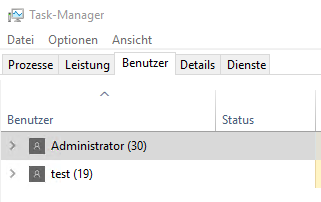icinga-powershell-plugins
 icinga-powershell-plugins copied to clipboard
icinga-powershell-plugins copied to clipboard
Invoke-IcingaCheckUsers should not count service/computer accounts
Hello,
right now the commands also counts service and cimputer accounts as logged in users and also a logged inuser multiple times even if he is logged in only once.
Iam not used to Powershell, but maybe this will help on how to get the user count correctly https://thesysadminchannel.com/get-logged-in-users-using-powershell/
Given on a test machine arte this users logged in:

Invoke-IcingaCheckUsers:
PS C:\Users\Administrator> Invoke-IcingaCheckUsers
[OK] Check package "Users"
| 'logged_on_users_umfd2'=1;; 'logged_on_users_umfd4'=1;; 'logged_on_users_umfd0'=1;; 'logged_on_users_system'=1;; 'logged_on_users_umfd3'=1;; 'logged_on_users'=16;; 'logged_on_users_dwm3'=1;; 'logged_on_users_dwm4'=1;; 'logged_on_users_dwm2'=1;; 'logged_on_users_test'=3;; 'logged_on_users_lokaler_dienst'=1;; 'logged_on_users_administrator'=3;; 'logged_on_users_netzwerkdienst'=1;;
Get-LoggedInUser:
ComputerName UserName SessionID SessionState
------------ -------- --------- ------------
VM35297 administrator 3 Aktiv
VM35297 test 4 Aktiv
Also iam not a windows administrator, so maybe remote powershell oder remote shell should also be testet, but for sure not system/service accounts
Best regards, Carsten
Thank you for the issue. Actually this check depends a lot on user permissions. If you are running the plugin with Administrative privileges, you will receive every single user on the system. If you are using a default user or the NT Authority\NetworkService (Icinga Agent default) you will receive a lot fewer users because you are not having the permission to check who is actually running.
So this depends on the user running the command in general and I'm already aware of users who found the detailed about while running as admin very useful
Hi,
would it be possible to enhance the check plugin with some kind of a filter? I have a use case where I am interested in the logged in users, but only where the session is active (and not disconnected).
Best regards Michael
I think something like this should be possible. I will have a look on this a created a PR once ready. In case there is a "quick" solution I will add this with v1.3.0 then.
I will keep you posted!
After digging into this issue I run into multiple issues. The only way to properly fetch if a user is currently active or disconnected, is by using a command line tool shipping with widows. The problem is, that the output is localised which means different languages will result in different outputs, making parsing impossible.
query user
BENUTZERNAME SITZUNGSNAME ID STATUS LEERLAUF ANMELDEZEIT
>icinga console 1 Aktiv Kein 19.11.2020 19:34
The Query command will print all users, including domain users.
Another approach would be Wmi and the Win32_Process class:
(Get-WmiObject win32_process | Where-Object name -Match explorer).GetOwner().User
icinga
The problem: There is no way to check of the user session is currently connected or disconnected with that.
Then is there qwinsta
qwinsta
SITZUNGSNAME BENUTZERNAME ID STATUS TYP GERÄT
services 0 Getr.
console 1 Verb.
>rdp-tcp#63 Administrator 2 Aktiv
icinga 3 Getr.
31c5ce94259d4... 65536 Abh rdp-tcp 65537 Abh
Same problem localized content.
So the last resort would be to use the wtsapi32.dll and query the Win32 API directly for this.
I would how ever like to keep Win32 API calls to a absolute minimum, because using C# in PowerShell works, but I would rather use more native solutions.
Andy ideas for solutions which I missed?
Yell at Microsoft ;)
Only solution i see is to compare agains an array of translation for the "Status"
I found the following PS module, maybe it is worth a look to learn how they did it.
https://archive.codeplex.com/?p=psterminalservices
Get-TSSession
The cmdlet sounds promising, but I think that they also use native API calls or some sort of parsing of the query user program.
Thank you very much. I might be blind, but I can only download the site archive. I'm unable to locate any PowerShell modules/scripts there. Is it just me?
@LordHepipud It is not just you, sorry for inconvenience. I found the project on GitHub:
https://github.com/imseandavis/PSTerminalServices/blob/master/PSTerminalServices/PSTerminalServices.psm1
Quick look into the source code, I found out that they are using a .NET library called cassia: https://github.com/danports/cassia
Thank you very much. I will move this topic to 1.4.0 for now. The best approach will be a full re-write of the plugin and the provider and propably the solution is to directly access the Win32 api.
I don't feel comfortable to use a third party library not being shipped directly by Windows for possible incompatibility reasons.
Once a first draft is available, I will create a PR for testing.
Thank you for all the feedback so far!
It also counts users accessing a fileserver (every session) and if you use JEA you'll have a lot of logged_on_users_winrm_va_151_servershortname_icinga users where 151 is a random id.
Is there any progress on this? Would it be possible to somehow use an additional exclude parameter to exclude specified users, for example as in the Invoke-IcingaCheckUsedPartitionSpace where you can exclude volumes?